Grasshoppers - the new sushi?
- Published
Elliot Mermel from Coalo Valley Farms explains why he thinks producing crickets and mealworms is the farming of the future
Tucked away in a warehouse on an industrial estate in the non-descript suburb of Van Nuys in Los Angeles, a revolution is taking place. And the revolutionaries? Five twentysomething college friends who are trying their hand at urban farming.
Their business is called Coalo Valley Farms but it couldn't be any further from a picture of agrarian life. The warehouse holds thousands of "micro livestock" as co-founder and chief executive Elliot Mermel calls them. That's crickets and mealworms to you and me.
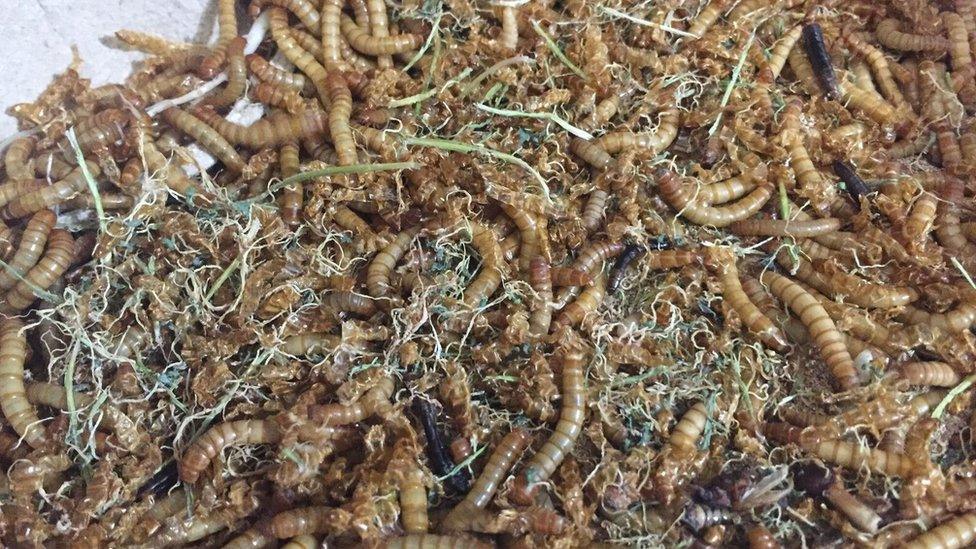
Some juicy mealworms
This is California's first insect farm for human consumption and its owners have grand plans.
"We know that insects are a sustainable source of protein - and while the world already struggles to feed seven billion, we want to try and help find a way to feed the future generations," says Elliot.
Eco-friendly creepy crawlies
The ecologically and environmentally sound principles of the venture in drought-stricken California are especially important to Elliot and his team.

Elliot Mermel believes insects should be part of a sustainable diet
He refers to the operation as "closed-loop" - which means almost everything is generated by the farm. The fish they farm provide wastewater that feeds the green shoots of alfalfa and mung beans, which in turn feed the crickets.
The "farm" looks more like a cannabis lab, which is funny because the team at Coalo actually borrowed the technology from the industry. Silver-covered tents that are heated and inside them, rows and rows of tubs and racks of insects.

Coalo Valley Farms uses technology from the cannabis industry
The company, which has only been operating since 2015, has fans in the health food and protein bar markets. But is insect eating - or entomophagy - seriously going to catch on?
Struggling industry in Mexico
South of the border in Mexico, where bugs have been consumed since pre-Hispanic times, the answer is more complex than it might first appear.
While culturally there isn't a widespread aversion to bug-eating - as there may be in the US - insects purposefully grown, such as those at Coalo Valley Farms, do not exist.
An apprehensive Katy Watson tries a worm in Mexico
Rene Cerritos is an evolutionary biologist at the National Autonomous University of Mexico. He's a firm fan of creepy crawlies and works with farmers to try to encourage bug production. He explains that of the 2,000 edible insect species in the world, Mexico has about a quarter of them - more than any other country. Yet demand is low.
"Westerners have a real issue consuming insects and that's the problem," says Rene. "Mexico is Westernising and so lots of traditions have been lost that we had since pre-Hispanic times. The insects are there, tonnes and tonnes of them - millions. And we could harvest and consume them but we don't do it."
Grasshoppers are a tasty treat in Mexico - but most farmers see them as pests
Pests hit profit
While in California they are growing crickets, in Mexico it's grasshoppers that are consumed. There are subtle physical differences and crickets are omnivores while grasshoppers are vegetarians.
Grasshoppers in Mexico are considered pests. They attack crops and reduce production, costing farmers dear.
As a result, Jose Moreno Sanchez is thinking outside the box. A farmer for 30 years, three years ago he came up with a different strategy.
"The grasshoppers ate crops and the financial damage was bad, especially when sowing vegetables. So we decided to make business out of grasshoppers instead of fighting them," he says.
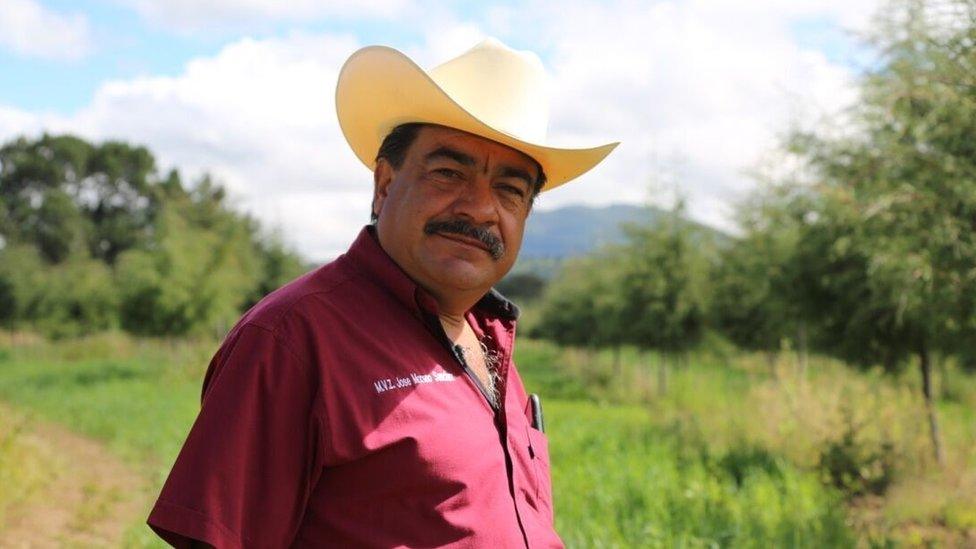
Jose Moreno Sanchez hopes to profit from the grasshoppers on his farm
Jose explains that the vast majority of grasshoppers are harvested informally. People who collect them don't own the land - they trample on the crops with their nets, angering farmers. And then sell their catch elsewhere.
The fact that farmers are so reluctant to embrace the bugs is a shame, says chef and food critic Alejandro Escalante. He reels off a list of insects he likes to cook with at his restaurant, La Casa del los Tacos, in the south of Mexico City - the small maggots called agave worms, scorpions and ticks, to name but a few.
They're delicious, he adds, crunching on a tick from the mesquite tree. "They're high in protein, they're tasty and there's a huge variety."

Find out more
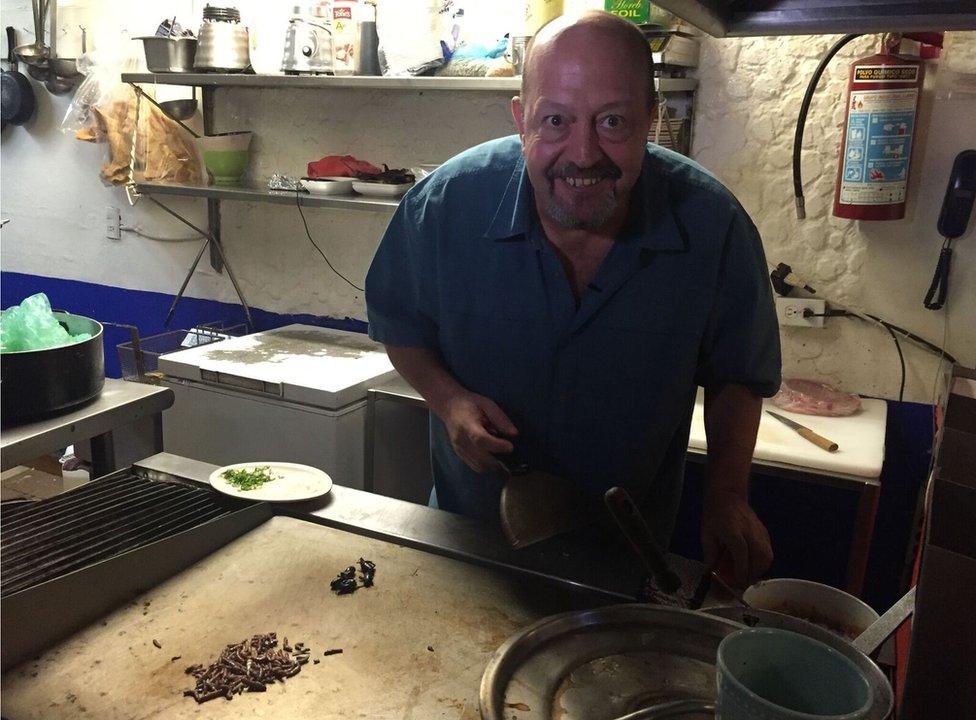
Katy Watson presents the Food Chain on BBC World Service.
Listen live at 08:32 GMT on Saturday, 17 September, or download the podcast.

Mexico's caviar
The San Juan market in the heart of Mexico City is testimony to that variety.
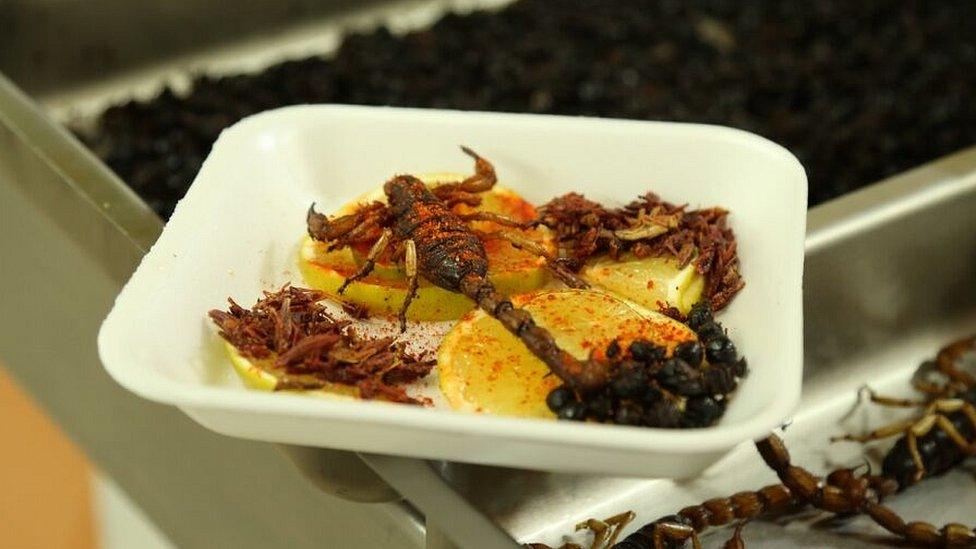
Fancy a seasoned scorpion?
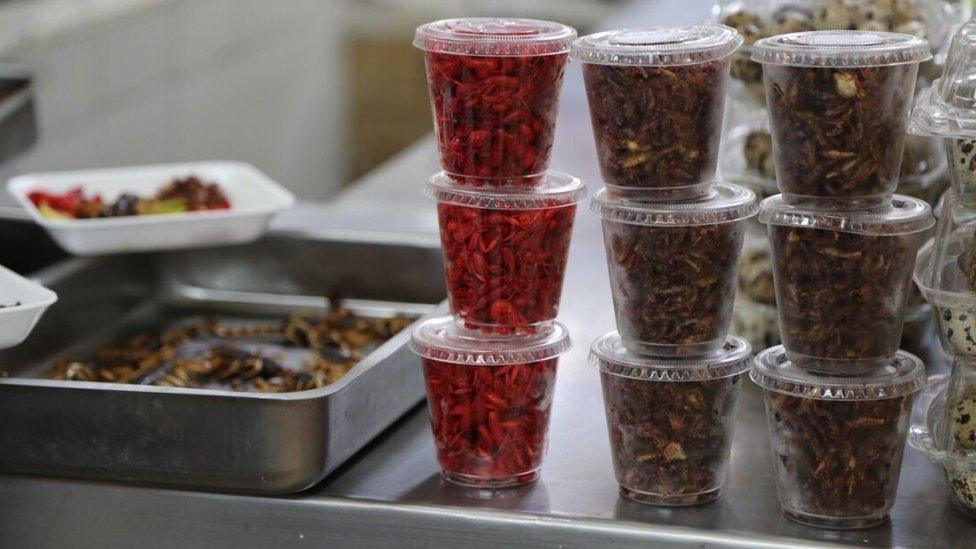
Or a snack pot of crickets?
The large warehouse is a gastronomic experience and home to a mind-boggling number of meat products including crocodile, ostrich and the more standard lamb, pork and chicken.
But those cuts, which are stacked high on tables or hanging whole from huge hooks, rub shoulders with smaller livestock: tarantulas, scorpions, grasshoppers and agave worms - some of which are still pink and wriggling.
These insects don't come cheap though.
And the lure of the potential profits on offer is one of the reasons that Alessandro Spagnuolo and his family started farming delicacies such as ant eggs or "escamoles" - known as the caviar of Mexico.
From delicacy to everyday food?
Alessandro runs the bug-focused company JCRedon. We met up at his family farm in Hidalgo, and they took us on a trek to find ant egg nests and agave plants that had worms in.

It's been a difficult season for the Hidalgo farm
This season has been tough - few plants have been found, which perhaps explains the price. Worms can fetch about $100 (£76) a kilo.
Their exclusivity is part of their charm for their well-heeled foodie fans but Alessandro is confident that his products will soon become more mainstream and export to Europe will one day be a reality. At the moment, regulations don't allow the export of insects for human consumption from Mexico to Europe.
"It's like sushi," says Alessandro, echoing a comparison made by Alejandro Escalante in his restaurant. "Twenty years ago hardly anyone in Europe thought raw fish was OK to eat - now it's everywhere. It's the same with insects."
Back in LA, Elliot and his band of micro livestock farmers are finding their customers like to take their product "de-legged" and often in powder form. Perhaps the idea of ordering a bug on a plate from a waiter or having a snack pot of crickets at home is still a hop too far for most outside of bug-eating cultures.
Katy Watson presents the Food Chain on BBC World Service. Listen live at 08:32 GMT on Saturday, 17 September, or download the podcast.